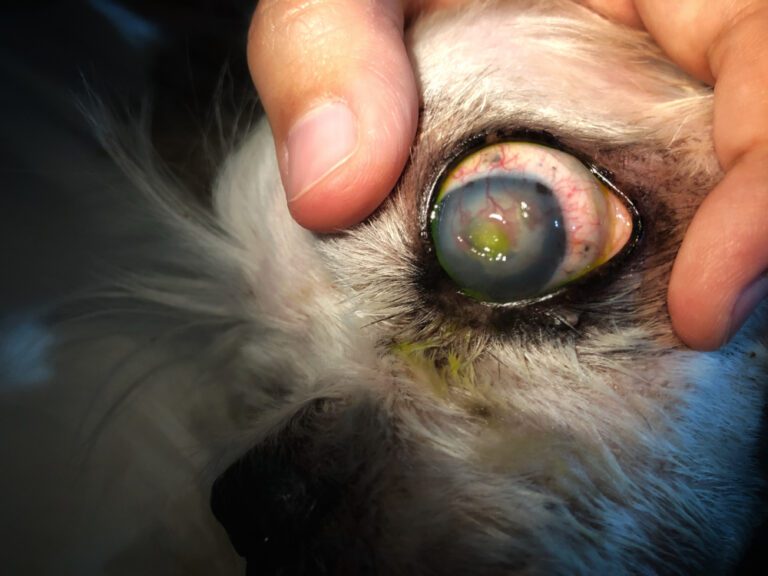Seizures in Shih Tzus: A Comprehensive Guide
Seizures in Shih Tzus can be a concerning and distressing experience for both pet owners and their beloved furry companions. As responsible pet caregivers, it is crucial to gain a comprehensive understanding of seizures in Shih Tzus to manage and support them during such episodes effectively.
Shih Tzus, known for their affectionate nature and distinctive appearance, are not immune to health issues, and seizures can be one of the conditions that affect them. In this guide, we will delve into the various aspects of seizures in Shih Tzus, exploring their causes, symptoms, and potential treatments. By arming ourselves with knowledge, we can take proactive measures to ensure the well-being of our Shih Tzus and provide them with the care they need.

What causes seizures in Shih Tzus?
Understanding the root causes of seizures in Shih Tzus is pivotal in formulating effective strategies for prevention and management. While seizures can be a manifestation of various underlying issues, pinpointing the specific triggers in Shih Tzus requires a closer examination of potential factors.
Genetic predispositions play a significant role in seizure occurrences in Shih Tzus. Certain hereditary conditions may make these charming companions more susceptible to seizures compared to other breeds. Additionally, environmental factors such as exposure to toxins, certain medications, or even stress can contribute to the onset of seizures.
In this section, we will explore the diverse range of factors that can precipitate seizures in Shih Tzus, shedding light on the interplay between genetics, environment, and overall health. By gaining insights into the causes, we empower ourselves to create an environment that minimizes risks and fosters the well-being of our Shih Tzu friends.
Join us on this informative journey as we unravel the complexities surrounding the triggers of seizures in Shih Tzus, providing you with valuable knowledge to better care for your cherished pet.
What are the common types of seizures in Shih Tzus?
Seizures in Shih Tzus manifest in various forms, and a nuanced understanding of the distinct types is vital for effective care and management. Each type presents unique challenges, and recognizing these differences empowers pet owners to provide tailored support during these episodes.
Generalized Tonic-Clonic Seizures
Generalized tonic-clonic seizures in Shih Tzus involve a sudden loss of consciousness, followed by distinct phases of muscle stiffness (tonic phase) and convulsions (clonic phase). Recognizing the signs promptly is crucial for timely intervention and minimizing distress for both the pet and the owner.
Identifying Precursors
Understanding the potential precursors to generalized tonic-clonic seizures is essential. Certain behaviors or physiological changes may serve as indicators, allowing pet owners to anticipate and manage seizures more effectively.
Intervention Strategies
Exploring specific intervention strategies for generalized tonic-clonic seizures provides pet owners with actionable steps to alleviate the severity of the episode and ensure the safety and well-being of their Shih Tzu.
Focal Seizures
Focal seizures in Shih Tzus target specific areas of the brain, leading to localized abnormal movements or behaviors. Recognizing the diverse presentations of focal seizures is crucial for providing targeted care and support.
Variations in Presentation
Examining the various variations in the presentation of focal seizures sheds light on the nuanced nature of these episodes. Pet owners can benefit from understanding these variations to respond appropriately.
Diagnostic Considerations
Delving into the diagnostic considerations for focal seizures equips pet owners with knowledge about the tests and assessments that can aid veterinarians in identifying the underlying causes, facilitating more targeted treatment approaches.
Petit Mal Seizures
Petit mal seizures, or absence seizures, represent another category seen in Shih Tzus. These seizures are characterized by brief lapses in consciousness and subtle behavioral changes, necessitating a specific approach for recognition and management.
Recognizing Subtle Signs
Identifying the subtle signs associated with petit mal seizures is crucial for distinguishing them from other behaviors. This recognition facilitates early intervention and appropriate care.
Long-Term Management
Exploring long-term management strategies for petit mal seizures involves understanding medication options, lifestyle adjustments, and regular veterinary check-ups to ensure the ongoing well-being of the Shih Tzu.
In this comprehensive exploration of the common types of seizures in Shih Tzus, we aim to equip pet owners with detailed insights into each seizure type. By delving into the nuances, we empower you to navigate the challenges associated with these episodes, fostering a proactive and informed approach to the care of your cherished pet.
Identifying signs and symptoms of seizures in Shih Tzus
Recognizing the signs and symptoms of seizures in Shih Tzus is fundamental for proactive and informed pet care. Early identification allows pet owners to provide timely assistance and seek veterinary guidance. Here, we explore the diverse indicators that may signal the onset of a seizure in your Shih Tzu.
Behavioral Changes
Observing behavioral alterations is a key aspect of identifying seizures in Shih Tzus. These changes may include sudden restlessness, excessive salivation, or uncharacteristic aggression. Understanding these behavioral cues enables pet owners to act swiftly when such signs manifest.
Pre-Seizure Behaviors
Certain behaviors exhibited by Shih Tzus before a seizure can serve as precursors. These pre-seizure behaviors may range from unusual pacing and whining to changes in responsiveness. Recognizing these early signs enhances the ability to anticipate and manage seizures effectively.
Post-Seizure Behaviors
Post-seizure behaviors are equally crucial to identify. Shih Tzus may display disorientation, fatigue, or temporary blindness after a seizure. Recognizing these post-seizure behaviors aids in providing comfort and support during the recovery phase.
Physical Manifestations
Understanding the physical manifestations of seizures is paramount. Shih Tzus experiencing seizures may exhibit uncontrollable shaking, tremors, or loss of consciousness. Familiarity with these physical signs ensures prompt recognition and appropriate action.
Muscle Rigidity
Muscle rigidity is a common physical manifestation during seizures. Pet owners should be attentive to any sudden stiffening of the body, as this can indicate the onset of a seizure.
Convulsions
The presence of convulsions, characterized by uncontrolled muscle contractions, is a notable physical symptom. Identifying convulsions helps pet owners distinguish seizures from other health issues and seek timely veterinary attention.
Altered Sensory Responses
Seizures in Shih Tzus can also manifest as altered sensory responses. These may include sudden changes in vision, auditory responses, or heightened sensitivity to stimuli. Recognizing these sensory alterations provides valuable insights into the nature of the seizure.
Temporary Blindness
Temporary blindness is a potential sensory response during seizures. Pet owners should be aware of any sudden visual impairments exhibited by their Shih Tzus, as this can be indicative of a seizure episode.
Heightened Sensitivity
Seizures may lead to heightened sensitivity, where Shih Tzus becomes unusually reactive to touch, sound, or light. Understanding these sensory changes contributes to a holistic comprehension of the seizure experience.
In this exploration of identifying signs and symptoms of seizures in Shih Tzus, we aim to empower pet owners with a nuanced understanding of the diverse indicators. By being attuned to behavioral, physical, and sensory cues, you can play a proactive role in ensuring the well-being of your beloved Shih Tzu during potential seizure episodes.
When to seek veterinary care for your Shih Tzu with seizures
Understanding when to seek veterinary care for your Shih Tzu experiencing seizures is essential for their well-being. Prompt intervention can help diagnose underlying causes and establish effective management strategies. In this section, we explore key indicators that signal the necessity of professional veterinary attention.
Frequency and Duration of Seizures
Regularly monitoring the frequency and duration of seizures is crucial. If your Shih Tzu experiences seizures more frequently or if the duration of individual seizures prolongs, it is a strong indication that veterinary care should be sought. Increased seizure activity may necessitate adjustments to the treatment plan.
Establishing a Seizure Log
Maintaining a seizure log allows pet owners to track the frequency, duration, and any notable patterns associated with seizures. This blog serves as a valuable resource for veterinarians, aiding in more accurate assessments and tailored care plans.
Changes in Seizure Presentation
Any notable changes in the presentation of seizures warrant veterinary attention. If the nature of the seizures evolves, such as a shift in intensity, duration, or associated behaviors, consulting with a veterinarian becomes imperative. These changes may indicate underlying health issues that require professional evaluation.
New or Worsening Symptoms
The emergence of new symptoms or a worsening of existing ones during seizure episodes is a red flag. These could include intensified convulsions, prolonged disorientation post-seizure, or the onset of additional health concerns. Veterinary consultation is essential to explore potential causes and appropriate interventions.
Cluster Seizures
Cluster seizures, where multiple seizures occur in close succession, pose an increased risk and demand immediate veterinary attention. This pattern can be indicative of a severe underlying condition or the potential for status epilepticus—a prolonged and life-threatening seizure state.
Emergency Veterinary Care
Recognizing the urgency associated with cluster seizures, pet owners should seek emergency veterinary care promptly. Timely intervention can prevent complications and ensure the best possible outcome for the Shih Tzu.
Seizures in Young or Senior Shih Tzus
Seizures in young or senior Shih Tzus may necessitate more vigilant veterinary monitoring. In these age groups, seizures can be indicative of different underlying causes, ranging from developmental issues to age-related conditions. Seeking veterinary care allows for age-specific assessments and tailored treatment plans.
Developmental Screening for Young Shih Tzus
For young Shih Tzus, a comprehensive developmental screening may be required to identify any congenital factors contributing to seizures. Veterinary guidance in these cases is instrumental in ensuring proper developmental care.
Age-Related Health Assessments for Seniors
Senior Shih Tzus may require age-related health assessments to determine if seizures are linked to conditions such as cognitive dysfunction or neurological degeneration. Veterinary care is essential for thorough evaluations and appropriate management.
By staying attuned to the frequency, changes in presentation, and specific circumstances surrounding seizures, pet owners can make informed decisions about when to seek veterinary care for their Shih Tzus. Early intervention not only enhances the quality of life for these beloved pets but also provides peace of mind for their caregivers.

Treatment options for Shih Tzus with seizures
Effectively managing seizures in Shih Tzus involves a comprehensive approach that combines veterinary expertise with proactive care at home. Understanding the available treatment options is crucial for providing the best possible quality of life for your cherished pet. Here, we explore various strategies and interventions designed to address seizures in Shih Tzus.
Veterinary Evaluation and Diagnosis: The first step in developing a treatment plan for Shih Tzus with seizures involves a thorough veterinary evaluation. Veterinarians will conduct comprehensive assessments, including physical examinations, blood tests, and imaging studies, to diagnose the underlying cause of the seizures. Accurate diagnosis lays the foundation for targeted and effective treatment.
Diagnostic Imaging: Advanced diagnostic tools such as MRI or CT scans may be employed to visualize the brain and identify structural abnormalities or lesions contributing to seizures. These imaging studies play a crucial role in tailoring treatment approaches to the specific needs of the individual Shih Tzu.
Medications for Seizure Control: Veterinarians may prescribe antiepileptic medications to control and manage seizures in Shih Tzus. Typical drugs prescribed for this condition comprise phenobarbital, potassium bromide, and levetiracetam. Proper administration and regular monitoring of these medications are essential to ensure their effectiveness and minimize potential side effects.
Monitoring Medication Levels: Regular monitoring of medication levels in the blood helps veterinarians adjust dosages as needed. This ensures that the Shih Tzu receives the optimal therapeutic effect while minimizing the risk of adverse reactions.
Dietary Modifications: Certain dietary modifications may aid in seizure management for Shih Tzus. Veterinarians may recommend specialized diets rich in specific nutrients, such as medium-chain triglycerides (MCTs), which have been shown to have potential benefits in reducing seizure frequency.
Role of Nutrition in Seizure Control: Exploring the role of nutrition in seizure control involves understanding the impact of various dietary components on brain function. Collaborating with veterinarians to design a nutritionally balanced diet can contribute to overall seizure management.
Lifestyle Adjustments: Making lifestyle adjustments can have a positive impact on Shih Tzus with seizures. Establishing a consistent daily routine, minimizing stressors, and providing a calm and supportive environment contribute to overall well-being and may help reduce the frequency of seizures.
Stress Reduction Techniques: Implementing stress reduction techniques, such as creating a quiet and comfortable space for the Shih Tzu, can be beneficial. This may include the use of soothing music, comfortable bedding, and positive reinforcement to create a stress-free environment.
Ongoing Veterinary Monitoring: Regular veterinary check-ups are essential for monitoring the overall health and seizure management of Shih Tzus. These check-ups enable veterinarians to assess the effectiveness of the treatment plan, make necessary adjustments, and address any emerging health concerns promptly.
Periodic Blood Tests: Periodic blood tests help assess the impact of medications on the Shih Tzu’s liver and kidney function. Monitoring these parameters ensures the continued safety and well-being of the pet.
The treatment options for Shih Tzus with seizures encompass a multidimensional approach involving veterinary diagnosis, medication management, dietary considerations, lifestyle adjustments, and ongoing monitoring. Collaborating closely with veterinarians and implementing these strategies collectively contributes to providing the best possible care for Shih Tzus experiencing seizures.
Preventive measures for reducing seizures in Shih Tzus
Proactive care and preventive measures play a crucial role in minimizing the occurrence and impact of seizures in Shih Tzus. By implementing strategies to reduce triggers and promote overall well-being, pet owners can significantly contribute to a healthier and more comfortable life for their beloved companions. Here, we explore preventive measures designed to reduce seizures in Shih Tzus.
Medication Adherence and Regular Veterinary Check-ups: Consistent adherence to prescribed medications is fundamental for seizure control. Pet owners should administer medications as directed by the veterinarian and attend regular check-ups to monitor the Shih Tzu’s response to treatment. This ensures that any necessary adjustments can be made promptly to maintain optimal seizure management.
Pill Administration Techniques: Pet owners may benefit from learning effective pill administration techniques to make the process smoother for both themselves and their Shih Tzu. Techniques such as hiding medication in treats or using specialized pill dispensers can aid in ensuring medication adherence.
Stress Reduction Strategies: Stress can be a significant trigger for seizures in Shih Tzus. Implementing stress reduction strategies, such as providing a calm environment, maintaining a consistent daily routine, and offering positive reinforcement, can contribute to a lower stress level for the pet.
Creating Safe Spaces: Creating designated safe spaces within the home allows Shih Tzus to retreat to a quiet and secure area during times of stress. This can be particularly beneficial during loud noises, changes in routine, or other potentially stressful situations.
Regular Exercise and Mental Stimulation: Ensuring Shih Tzus receive regular exercise and mental stimulation is vital for their overall well-being. Physical activity not only helps maintain a healthy weight but also provides an outlet for excess energy, reducing the likelihood of stress-induced seizures.
Interactive Toys and Activities: Incorporating interactive toys and activities into Shih Tzu’s daily routine stimulates mental engagement. Puzzle toys, treat-dispensing toys, and short training sessions can help keep the mind active and focused.
Nutritional Considerations: Exploring nutritional considerations can be a preventive measure for reducing seizures in Shih Tzus. Consultation with a veterinarian to determine an appropriate diet, potentially incorporating specific nutrients such as omega-3 fatty acids, may contribute to overall brain health.
Specialized Diets: Certain specialized diets designed for seizure management may be recommended. These diets often contain specific ingredients that support neurological health and may help reduce the frequency of seizures.
Environmental Modifications: Making modifications to the Shih Tzu’s environment can contribute to seizure prevention. Removing potential hazards, securing electrical cords, and minimizing exposure to toxins are essential steps in creating a safe living space.
Toxin Awareness: Educating oneself about common household toxins and plants that may be harmful to Shih Tzus is crucial. This awareness allows pet owners to take proactive measures to eliminate or secure potential hazards.
By incorporating these preventive measures into the care routine, pet owners can actively contribute to reducing the frequency and impact of seizures in their Shih Tzus. A holistic approach that combines medication adherence, stress reduction, regular exercise, proper nutrition, and environmental awareness enhances the overall quality of life for these beloved companions.
Helpful resources for managing seizures in Shih Tzus.
When it comes to managing seizures in Shih Tzus, access to valuable resources can make a significant difference. Here are some helpful sources to guide you through the process:
1. Veterinary Consultation
Establish a strong partnership with a knowledgeable veterinarian specializing in neurology or canine epilepsy. Regular check-ups and open communication are crucial for monitoring your Shih Tzu’s health and adjusting treatment plans as needed.
2. Canine Epilepsy Support Groups
Online forums and support groups dedicated to canine epilepsy provide a platform for sharing experiences, seeking advice, and staying informed about the latest developments in seizure management. Connecting with other pet owners facing similar challenges can offer valuable insights and emotional support.
3. Educational Websites:
Explore reputable websites focused on canine health, particularly epilepsy in dogs. These platforms often feature informative articles, guidelines, and resources on managing seizures in specific breeds, including Shih Tzus. Stay informed about the latest research and best practices to optimize your pet’s care.
4. Pet Nutrition Experts:
Consult with pet nutrition experts or veterinary nutritionists to explore dietary adjustments that may complement the overall seizure management plan for your Shih Tzu. Proper nutrition can play a crucial role in supporting your pet’s overall well-being.
5. Training and Behavioral Experts
Engage with professional trainers and behavioral experts to develop stress reduction strategies and create a positive environment for your Shih Tzu. Training techniques and behavioral modifications can contribute to minimizing triggers that may lead to seizures.
6. Holistic Veterinary Care
Consider holistic approaches to complement traditional treatments. Techniques such as acupuncture, herbal remedies, or other alternative therapies may have positive effects. Always consult with your veterinarian before introducing new treatments to ensure they align with your Shih Tzu’s specific needs.
By leveraging these helpful resources, you can navigate the complexities of managing seizures in Shih Tzus more effectively, ensuring the best possible care for your beloved furry friend.
Conclusion
In conclusion, the journey of managing seizures in Shih Tzus is marked by a commitment to understanding, care, and collaboration. Recognizing the signs, seeking timely veterinary care, exploring treatment options, and implementing preventive measures are integral components of providing a fulfilling life for these cherished companions.
As pet owners, your dedication to medication adherence, regular veterinary check-ups, stress reduction, and a well-balanced diet forms the foundation of a proactive care routine. By staying informed and tapping into helpful resources, such as veterinary consultations, support groups, educational websites, and holistic approaches, you empower yourself to navigate the challenges associated with canine epilepsy.
Remember, each Shih Tzu is unique, and a personalized approach that considers their individual needs ensures a happy and healthy life. With the right resources and a compassionate approach, you can provide your Shih Tzu with the support they need to thrive despite the challenges of seizures. Together, with the guidance of professionals and the support of a caring community, you can enhance the well-being of your beloved furry companion.







